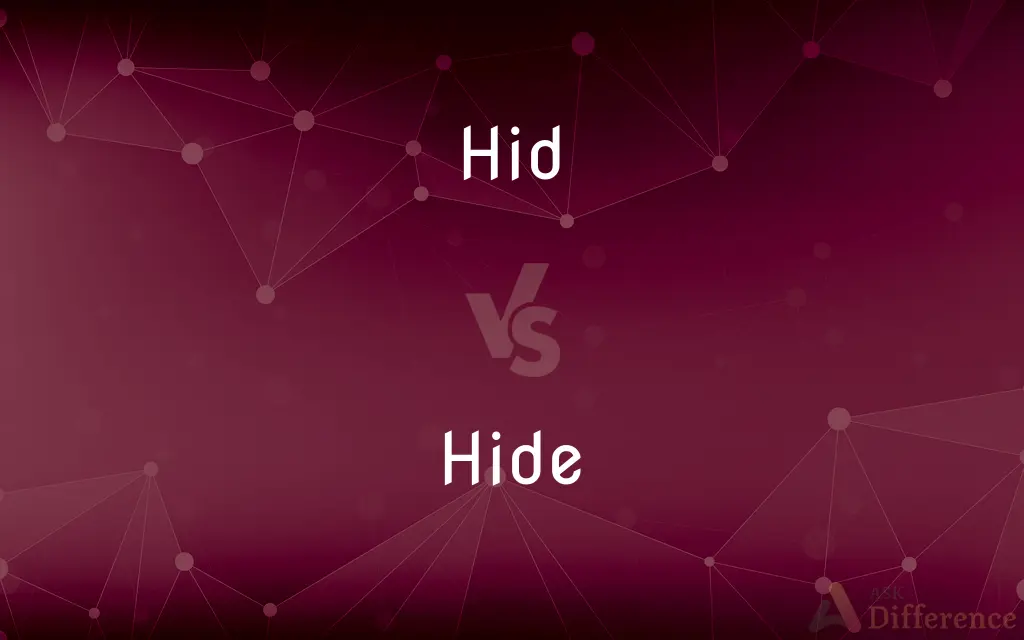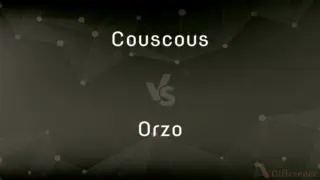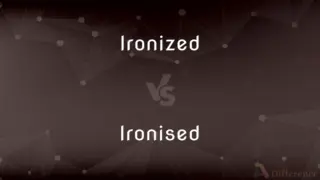Hid vs. Hide — What's the Difference?
Edited by Tayyaba Rehman — By Maham Liaqat — Updated on April 20, 2024
"Hid" is the past tense of "hide," indicating completed action, e.g., "She hid the gift," whereas "hide" can be a present tense verb or a noun referring to animal skin.

Difference Between Hid and Hide
Table of Contents
ADVERTISEMENT
Key Differences
"Hid" is used to describe an action that has already been completed in the past, focusing on concealment or protection. For example, during a game of hide-and-seek, a child might say, "I hid behind the tree." On the other hand, "hide" in its verb form describes an ongoing or habitual action of concealment. For instance, "They often hide the keys in a drawer."
In its noun form, "hide" refers to the skin of an animal, especially when it has been removed for tanning. This usage is common in contexts relating to leather goods. Whereas "hid" has no noun form and strictly relates to the past action of hiding.
The verb "hide" changes form to indicate tense and perspective. For instance, "hides," "hiding," and "hidden" are other forms of the verb depending on the context. Meanwhile, "hid" remains constant, always indicating the simple past.
Usage in literature and storytelling often sees "hid" employed to create a sense of suspense or reveal past secrets. Whereas, "hide" might be used more dynamically to describe actions as they occur or habits.
In everyday language, "hid" is straightforward, needing no modification to convey a complete thought about past actions. On the other hand, "hide" can be versatile, functioning in various grammatical constructions and tenses to discuss current or future actions.
ADVERTISEMENT
Comparison Chart
Part of Speech
Verb (past tense)
Verb (present) or Noun
Usage in Tense
Indicates completed action
Indicates ongoing action or noun
Example
She hid the letter.
They hide the treats. / Cowhide.
Common in
Narrative past actions
Present descriptions & objects
Forms
Does not change form
Changes form (hides, hiding)
Compare with Definitions
Hid
Past simple tense of hide, used for actions completed in the past.
Yesterday, I hid all the clues for the treasure hunt.
Hide
To conceal something or someone from view.
Hide the gifts before the kids come downstairs.
Hid
Indicates secretive or protective action completed previously.
He hid the documents in the safe before leaving.
Hide
The skin of a large animal, especially when removed.
The hunter sold the deer hide.
Hid
Commonly used in narrative or recounting past events.
She hid under the bed during the game.
Hide
Versatile in usage across different tenses.
They will hide the treasure tomorrow.
Hid
Implies a completed action without ongoing effects.
They hid the leftover pie where no one could find it.
Hide
Present tense verb indicating the act of hiding.
He hides the key under the mat every morning.
Hid
Used to describe an action that was deliberately secretive.
The spy quickly hid the evidence.
Hide
Used metaphorically to represent thickness or resilience.
You'll need a thick hide to handle criticism in this job.
Hid
Past tense and a past participle of hide1.
Hide
To put or keep out of sight or away from notice
Hid the money in a sock.
Hid
(archaic) hide
Hide
To prevent the disclosure or recognition of; conceal
Tried to hide the facts.
Hide
To cut off from sight; cover up
Clouds hid the stars.
Hide
To avert (one's gaze), especially in shame or grief.
Hide
To keep oneself out of sight or notice.
Hide
To seek refuge or respite
"no place to hide from boredom or anger or loneliness" (Matt Teague).
Hide
To beat severely; flog.
Hide
The skin of an animal, especially the thick tough skin or pelt of a large animal.
Hide
An old English measure of land, usually the amount held adequate for one free family and its dependents.
Hide
(transitive) To put (something) in a place where it will be harder to discover or out of sight.
He hides his magazines under the bed.
The politicians were accused of keeping information hidden from the public.
Hide
(intransitive) To put oneself in a place where one will be harder to find or out of sight.
Hide
To beat with a whip made from hide.
Hide
(countable) The skin of an animal.
Hide
The human skin.
Hide
One's own life or personal safety, especially when in peril.
To save his own hide
Better watch his hide
Hide
(countable) mainly British A covered structure from which hunters, birdwatchers, etc can observe animals without scaring them.
Hide
A secret room for hiding oneself or valuables; a hideaway.
Hide
(countable) A covered structure to which a pet animal can retreat, as is recommended for snakes.
Hide
(historical) A unit of land and tax assessment of varying size, originally as intended to support one household with dependents.
Hide
To conceal, or withdraw from sight; to put out of view; to secrete.
A city that is set on an hill can not be hid.
If circumstances lead me, I will findWhere truth is hid.
Hide
To withhold from knowledge; to keep secret; to refrain from avowing or confessing.
Heaven from all creatures hides the book of fate.
Hide
To remove from danger; to shelter.
In the time of trouble he shall hide me in his pavilion.
Hide
To lie concealed; to keep one's self out of view; to be withdrawn from sight or observation.
Bred to disguise, in public 'tis you hide.
Hide
To flog; to whip.
Hide
An abode or dwelling.
Hide
The skin of an animal, either raw or dressed; - generally applied to the undressed skins of the larger domestic animals, as oxen, horses, etc.
Hide
The human skin; - so called in contempt.
O tiger's heart, wrapped in a woman's hide!
Hide
The dressed skin of an animal (especially a large animal)
Hide
Body covering of a living animal
Hide
Prevent from being seen or discovered;
Muslim women hide their faces
Hide the money
Hide
Be or go into hiding; keep out of sight, as for protection and safety;
Probably his horse would be close to where he was hiding
She is hiding out in a cabin in Montana
Hide
Cover as if with a shroud;
The origins of this civilization are shrouded in mystery
Hide
Make undecipherable or imperceptible by obscuring or concealing;
A hidden message
A veiled threat
Common Curiosities
What are the different forms of the verb "hide"?
The verb "hide" has several forms including "hides," "hiding," and "hidden," depending on the tense and context.
What is the primary function of the word "hid"?
"Hid" is the past tense of "hide," used to indicate that an action of concealment has been completed in the past.
Is "hid" used in modern English?
Yes, "hid" is regularly used in modern English to discuss past events where something was concealed.
What tense is associated with "hid"?
"Hid" is associated with the simple past tense.
What is an example of "hide" used as a noun?
An example would be, "The craftsman used cowhide to make the wallet."
How can "hide" be used metaphorically?
In metaphorical use, "hide" can describe someone's ability to withstand criticism, as in needing a "thick hide."
What does "hid" imply in a narrative?
In a narrative, "hid" implies past secretive or protective actions that have already occurred.
How is "hide" different when used as a verb and a noun?
As a verb, "hide" refers to the action of concealing, while as a noun, it refers to animal skin used for leather.
What contexts are appropriate for using "hid"?
"Hid" is appropriate in narratives or recounting past events where concealment was involved.
Why is "hid" important in storytelling?
"Hid" helps build suspense or reveal crucial elements about past events in stories.
How does the verb "hide" function in a sentence?
As a verb, "hide" can function to describe current or habitual actions of concealing something or someone.
Can "hide" be a noun?
Yes, "hide" can also be a noun referring to the skin of an animal, particularly when it's used or processed.
Can "hid" change form based on tense?
No, "hid" does not change form; it is strictly the past tense of "hide."
What should be considered when choosing between "hid" and "hide"?
The choice depends on whether the action is completed (past) or ongoing (present), and whether the term is used as a verb or noun.
How does "hide" enhance descriptive language?
"Hide" can make descriptions more dynamic by indicating ongoing or habitual actions.
Share Your Discovery

Previous Comparison
Couscous vs. Orzo
Next Comparison
Ironized vs. IronisedAuthor Spotlight
Written by
Maham LiaqatEdited by
Tayyaba RehmanTayyaba Rehman is a distinguished writer, currently serving as a primary contributor to askdifference.com. As a researcher in semantics and etymology, Tayyaba's passion for the complexity of languages and their distinctions has found a perfect home on the platform. Tayyaba delves into the intricacies of language, distinguishing between commonly confused words and phrases, thereby providing clarity for readers worldwide.














































